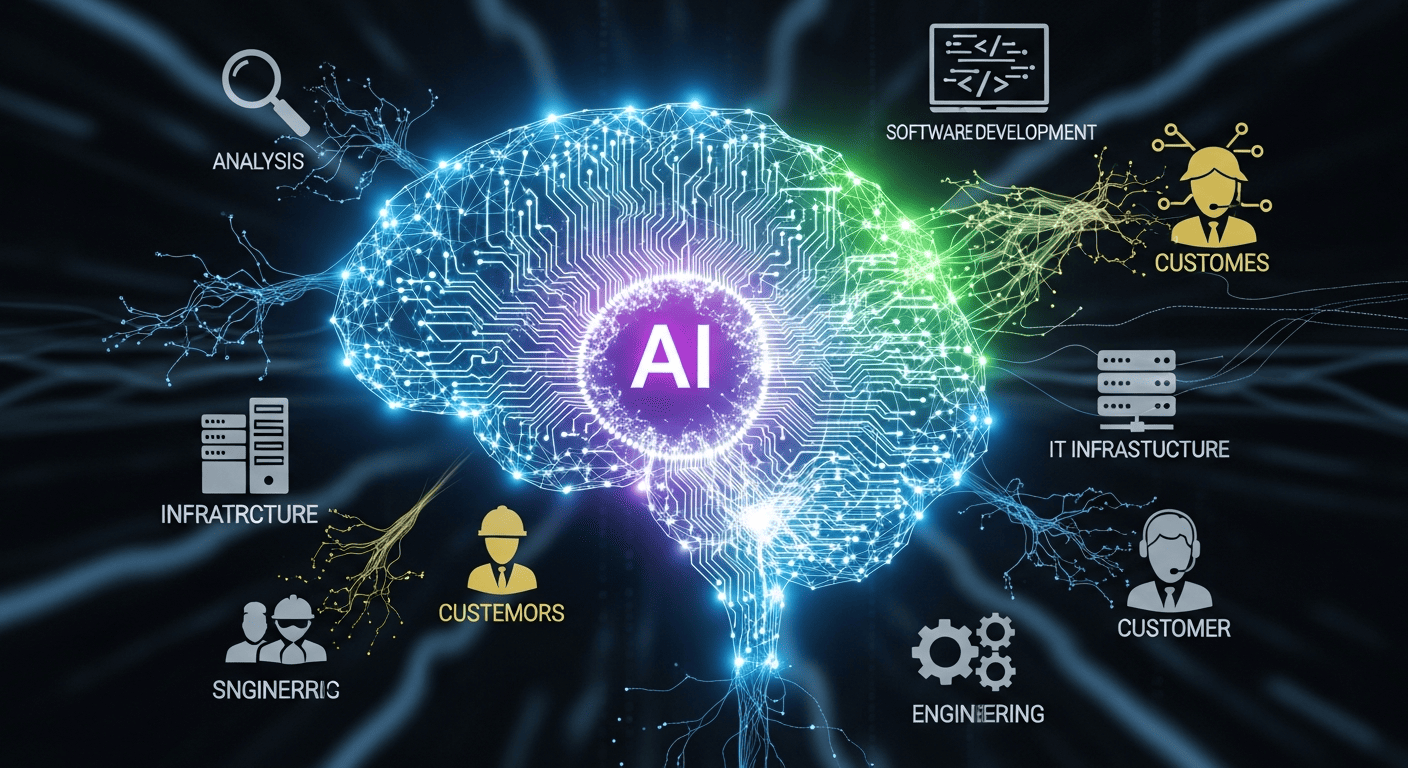How AI Is Reshaping Tech Jobs — And What It Means for the Future

AI’s Growing Influence on Tech Jobs
AI is no longer just a futuristic concept—it’s actively transforming how software is built, managed, deployed, and maintained. Over the past two years, generative AI, autonomous coding assistants, and AI-driven automation tools have pushed the tech industry into one of its fastest transitions ever. Companies are restructuring teams, developers are adopting AI copilots, and organizations are rethinking the skills they must cultivate to stay competitive.
This shift matters because the tech workforce sits at the center of innovation. When AI changes how people code, design, test, secure, and operate systems, the ripple effects reach every sector. From startups reimagining product development to enterprises automating routine engineering tasks, the impact of AI on tech jobs is undeniable—and it’s reshaping both risks and opportunities for millions of workers globally.
Background & Context: A Decade of Automation Leading to Today
Automation has long played a role in software development—from CI/CD pipelines to cloud orchestration—but the new wave of AI takes it much further. Early machine learning models automated small tasks, but the introduction of large language models and generative AI fundamentally expanded what machines can do.
Today, AI can write code, debug, generate documentation, identify security flaws, optimize infrastructure, and even create product prototypes. Companies that once relied solely on large engineering teams now leverage AI-first workflows that speed up delivery and reduce manual dependency.
This evolution didn’t happen overnight. The push began with DevOps automation, grew with cloud-native development, and accelerated with breakthroughs in deep learning. Now, AI is positioned not just as a productivity enhancer—but as a strategic partner in software creation.
Expert Quotes / Voices: What Leaders Are Saying
Industry experts widely acknowledge that AI is becoming integral to the tech workforce—not as a replacement, but as a powerful augmentation tool.
Sarah Linden, Chief Scientist at a leading AI research firm, notes:
“AI is shifting tech roles from execution-heavy to decision-heavy. Developers who embrace AI become exponentially more productive, not obsolete.”
Meanwhile, enterprise CIO David Harper highlights the talent shift:
“Companies aren’t looking to reduce tech teams—they’re looking to evolve them. AI fluency is now as important as programming fluency.”
Economists echo this sentiment. Dr. Nina Ortega, a labor-tech analyst, says:
“The fear of job loss is real, but the larger trend shows job transformation, not elimination. The biggest winners will be those who upskill early.”
Market & Industry Comparisons: A Mixed Landscape of Roles Rising and Roles Declining
The impact of AI on tech jobs varies significantly across industries:
- Software Development: Coding assistants have reduced routine work; demand is rising for roles involving architecture, system design, and AI orchestration.
- IT Operations: Automation is replacing manual monitoring, but boosting demand for AIops engineers and cloud automation specialists.
- Cybersecurity: AI speeds threat detection but requires more analysts skilled at supervising AI-driven security systems.
- Data Science: Basic data processing is automated, while demand intensifies for advanced analytics, model governance, and AI strategy roles.
- UX/UI: Generative design tools automate layouts, but research-based design and human-centered strategy remain irreplaceable.
In short, AI is compressing low-level tasks while expanding high-level responsibilities.
Implications & Why It Matters: New Skills, New Jobs, New Pressures
The impact of AI on tech jobs creates profound implications:
- For workers: Continuous learning has become non-negotiable. AI literacy, prompt engineering, and system-level thinking are now essential skills.
- For employers: Hiring strategies are shifting toward multi-disciplinary talent—people who can combine coding with AI reasoning, data insights, or product thinking.
- For the industry: Productivity is rising, timelines are shrinking, and companies that fail to adopt AI risk falling behind.
The balance of power is also shifting. AI democratizes capabilities—junior developers can now ship work that once required senior-level expertise. This levels the playing field but also raises expectations for speed and quality.
What’s Next: The Future of Tech Work in an AI-Augmented World
The next 5–10 years will reshape tech work even further:
- AI copilots will become standard across all software roles
- New job categories like “AI workflow architect” and “autonomous system engineer” will emerge
- Companies will expect hybrid human–AI workflows
- Ethical oversight and AI governance skills will surge in demand
- Global competition for AI-skilled talent will intensify
Workers who adapt will find more opportunities than ever. Those who resist change may face rapid skill obsolescence.
Our Take
AI isn’t replacing the tech workforce—it’s redefining it. The shift from manual execution to intelligent collaboration represents a new era where human creativity, judgment, and strategy matter more than ever. The future belongs to teams that treat AI not as a threat but as an accelerator, blending human expertise with machine intelligence to build what once felt impossible.